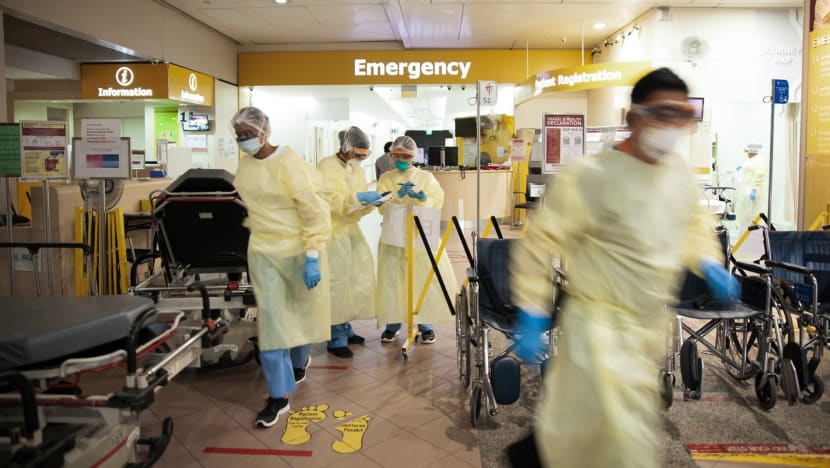Singapore reports no COVID-19 deaths for first time in more than 3 months

The accident and emergency (A&E) department at Tan Tock Seng Hospital in Singapore, in a photo posted on Sep 19, 2021. (Photo: Facebook/Tan Tock Seng Hospital)
SINGAPORE: Singapore on Friday (Dec 24) reported no deaths from COVID-19 for the first time in more than three months.
This comes as the daily numbers of community cases in December have fallen from the peaks in November.
With no new deaths reported on Friday, the country's death toll from coronavirus complications stood at 820.
The last time there were no fatalities from the virus was on Sep 19, when the death toll was 60. Since then, as cases rose exponentially, the daily number of people who died went up as well.
START OF THE WAVE
The Government has dated the start of the current wave of infections to Aug 23. That month, there were several community clusters, including at places providing essential services, such as bus interchanges.
Singapore was then in its preparatory stage of transitioning to a "COVID-19 resilient" nation. This involved opening up further with vaccination-differentiated measures as more people became vaccinated against the disease.
A high of 18 virus-related deaths were reported in August, with total daily infections hovering between 100 and 200 in the last week of the month. But the wave had not crested yet.
On Sep 6, the Ministry of Health (MOH) first sounded the alarm that Singapore faced an increasing likelihood of an exponential rise in infections.
Cases - which totalled 241 on that day - were doubling every week, said multi-ministry task force co-chair Lawrence Wong.
Based on the experience of other countries, a sharp rise in infections would mean more cases in the intensive care unit and more people succumbing to the virus, said Mr Wong.
Four days later, MOH said that Singapore was experiencing an "exponentially rising" wave of infections in the community. The country reported 573 cases that day.
Higher case numbers were expected as the country opened up, but the sharp rate of increase was worrying, said task force co-chair Gan Kim Yong.
However, leaders said the exponential rise would not throw off-course Singapore's transition to living with endemic COVID-19.
"For now, we are not reversing, we still want to progress on our transitioning journey. But we're not racing ahead, we are actively responding, watching and monitoring," said Health Minister Ong Ye Kung then.
THE WAVE PEAKS
On Sep 17, Mr Ong warned that Singapore should be prepared to see its daily cases hit the 1,000 mark "soon", calling this the "typical behaviour of a transmission wave that typically peaks between four and up to eight weeks".
The next day, the daily number of cases crossed the 1,000 mark.
While Singapore had also reported four-digit daily caseloads during the infection wave in 2020 in migrant workers' dormitories, this time the outbreak was centred in the community.
The four-digit caseloads continued for months.
September went on to break August's record, with 40 fatalities reported. The daily caseloads crossed and stayed above the 2,000 mark going into October.
Daily infections continued rising and peaked at 5,324 on Oct 27, setting the current record for the highest number of daily cases since the start of the pandemic.
In the month of October alone, 312 deaths were reported - more than three times the total fatalities recorded from the start of the pandemic to the end of September this year.
RIDING IT OUT
On Oct 23, Mr Wong said that the Government would allow some community safe management measures to ease if the weekly infection growth rate dropped below 1.
The weekly infection growth rate refers to the ratio of community COVID-19 cases in the past week over the week before. A figure below 1 means the number of new weekly cases is falling.
The weekly growth rate dipped below 1 from Nov 3 to Nov 11, and again from Nov 13, where it has remained below the threshold figure ever since.
Daily caseloads have fallen steadily, finally coming and staying under the 1,000 mark on Dec 3.
While Singapore seems to be nearing the end of this current wave, the Omicron variant, which is believed to be more transmissible, could soon present another challenge.
Already, the Government is preparing to ramp up healthcare capacity for a potential surge of Omicron cases. It has also frozen new ticket sales for Singapore's vaccinated travel lanes until Jan 20 next year, citing the "rapid spread" of Omicron in other countries.
"The surge in cases over the last three months is subsiding. We have protected our healthcare system and kept fatalities low," said Prime Minister Lee Hsien Loong last week.
"We are not yet out of the woods, but we are confident that we can cope with Omicron, because with vaccinations and boosters, we are in a much stronger position today to deal with COVID-19."
Singapore confirmed 82 new Omicron cases on Friday, comprising 17 local infections and 65 imported cases.
BOOKMARK THIS: Our comprehensive coverage of the COVID-19 pandemic and its developments
Download our app or subscribe to our Telegram channel for the latest updates on the coronavirus pandemic: https://cna.asia/telegram














